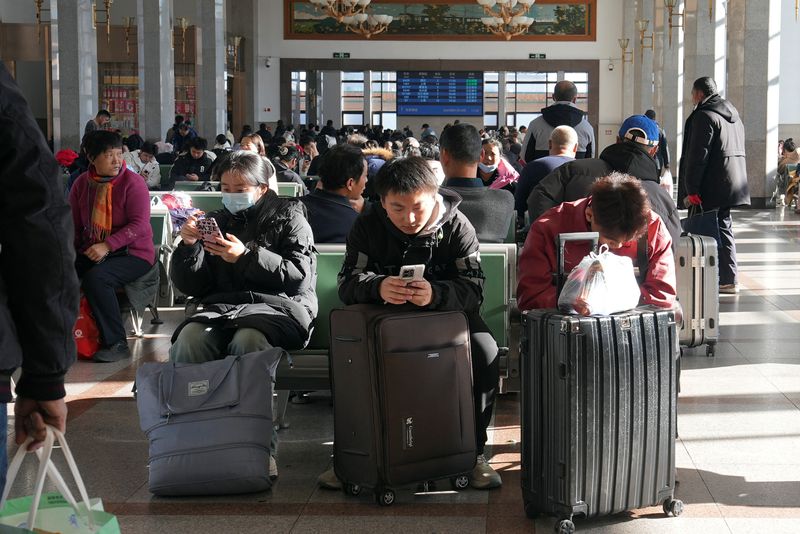By Liz Lee
BEIJING (Reuters) – The annual travel rush for China’s Lunar New Year celebrations officially began on Tuesday, with many taking a mental break from their worries about the future to reunite with family or take a vacation.
The peak travel season in the world’s second-largest economy kicked off with a train departing Beijing just after midnight, taking early bird passengers from the capital to Hefei in eastern Anhui province.
Most people aim to be with family for the traditional reunion dinner on New Year’s Eve, which falls on January 29 this year.
The 40-day travel season will continue until February 22, during which officials estimate a record 9 billion domestic trips will be made. The forecast matches that for 2024, although only 8.4 billion trips were actually made during last year’s festivities.
Railway passenger numbers are expected to exceed 510 million passengers, while more than 90 million passengers are expected to fly. However, the number of trips by private vehicle is expected to reach 7.2 billion trips, or about 80% of total domestic passenger flows, national television broadcaster CCTV said.
Most of China’s 1.4 billion people will celebrate this year’s Lunar New Year, also known as the Spring Festival, at a time when the economy is struggling to maintain a sustainable recovery due to weak domestic demand and a prolonged asset market crisis. Struggling for
Some passengers said they would not let the state of the economy shine over the upcoming celebrations.
“Although the economy has slowed down, I think the whole country is taking care of (the economic situation) and we, the common people, are living well (day to day),” said 55-year-old Wang Zhixu. The former who works in property management services, and was stationed in Beijing.
“Peace within our country gives us the greatest joy.”
Air travelers buying multi-destination tickets for the festive period have increased by 50% compared to last year, CCTV said, and hotel bookings have increased in some counties.
Beijing, Guangzhou, Harbin, Dali and Fuzhou were popular destinations for holidaymakers to make the most of the eight-day public holiday.
But youth looking for work have a different perspective.
Shi Zhenyu, 22, was on her way to Harbin for a vacation with friends before traveling to Wuxi in eastern Jiangsu province to celebrate the New Year with family, hoping the economy would improve so she could join the workforce.
“If the economy improves (in the new year), I’ll have a better chance of finding a job, and I won’t have to go back to study for a master’s or doctorate degree. And if the economy improves, my father The bonus (from work) will not be halved, everything else is fine,” Xi said.
Youth unemployment hit 18.8% last August, the highest since authorities changed the way the figures are calculated in December 2023. Unemployment figures have improved somewhat in recent months, pushing millions of college graduates to accept low-paying work or even subsist on their parents’ pensions.
Some have even abandoned the stress of big cities for a simpler life away from the hustle and bustle.
For the 33-year-old, who lives with his fiancée in northeastern Liaoning province, the slower pace of life is a comfort.

“Because we’re not in a very big city like everybody else, maybe we don’t have a lot of pressure,” said the small business owner, who gave only his surname.
“We even lived in the big city for a while after graduation, and then we decided to go back to our home where we felt we were friendly and happy,” she said.










